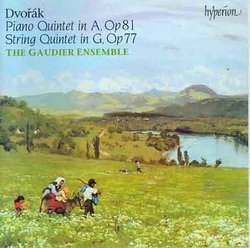| All Artists: Antonin Dvorak, Gaudier Ensemble Title: Dvorák: Piano Quintet, Op. 81; String Quartet, Op. 77 Members Wishing: 1 Total Copies: 0 Label: Hyperion UK Release Date: 1/23/1996 Album Type: Import Genre: Classical Styles: Chamber Music, Historical Periods, Classical (c.1770-1830) Number of Discs: 1 SwapaCD Credits: 1 UPC: 034571167961 |
Search - Antonin Dvorak, Gaudier Ensemble :: Dvorák: Piano Quintet, Op. 81; String Quartet, Op. 77
 | Antonin Dvorak, Gaudier Ensemble Dvorák: Piano Quintet, Op. 81; String Quartet, Op. 77 Genre: Classical
|
Larger Image |
CD Details |
CD ReviewsDvorak's greatest chamber masterpiece Alan Lekan | Boulder, CO | 03/18/2006 (5 out of 5 stars) "Musicologists recognize three piano quintets as masterpieces of the form: Schumann's Op. 44, Brahms' Op. 34 and Dvorak's Op. 81 here. In the latter, each movement is structurally well conceived, classically balanced and filled with rich melodies within a compelling musical progression that never stagnates. In simpler terms: it is emmensely enjoyable and musically satisfying. Dvorak's piano quintet was one of three chamber works composed around 1887 as part of his renewed commmitment to the Czech nationalistic folk style (the E-flat piano quartet and the "Dumky" piano trio were the others). As such the music abounds in attractive and idiomatic Bohemian melodies - particularly the plaintive slow "Dumka" movement. It is certainly one of - if not the - finest chamber works Dvorak composed and music easily appreciated by listeners of any musical background.
The Guadier Ensemble featuring Susan Tomes on piano do justice to Dvorak's peasant-minded music with lively dance rhthyms and folky inflections that exude the right flavor for this Bohemian music. Overall, this ensemble takes a smooth and somewhat "sweet" approach to this work that is poised, vibrant and inticing. Having some 30 chamber recordings to her credit, Susan Tomes once again shines in the thick piano writing in the quintet - reinforcing her reputation as a true master of the Romantic chamber genre. In the driving opening and Scherzo movements, her rhythms are super crisp and articulate; her running demisemiquavers ripple with excitement and verve. Yet, ever the sensitive musician, she does not overwhelm the others and rises and falls in intensity as needed. They are well recorded with clear definition, fullness and balance of each instrument in an optimally-resonant sound environment. The companion piece is an earlier String Quintet (Op. 77) which was one of three such string quintets Dvorak composed but unique in the scoring for double bass (like Schuber's "Trout" Quintet). Listeners with a high-end sound system will really get to show off the deep bass response of their expensive speakers with the bass here. Overall, The Gaudier Ensemble gives a spirited yet lighthearted performance of this attractive work that makes it a fine coupling of a rarer piece. As usual for Tomes and her companions, they seem to find their greatest expression in the slow and lighthearted movements. Both Gramophone and Penguin Guide gave good reviews of this CD (Penguin 3/3 stars) which reinforces this recording as one of the top choices around. Another notable performance of the piano quintet worth comparing comes from the (partly Hungarian) Takacs Quartet featuring Andreas Haeflinger on piano. The Takacs Quartet as usual is plush and velvety in tone and bring out the Czech songfulness in the music with slightly more richness than Tomes and the Gaudier Ensemble. Of particular note is Andeas Haefliger's propelling rhythmic drive (particularly in the opening movement) that come off a bit more exciting and prominently projected than that of the more mild-mannered but equisite Susan Tomes. Equally attractive is The Takacs Quartet's idiomatic performance of the folk-imbued late String Quartet No. 10 and the brilliant Decca sound. As both the Gaudier and Takacs are superb readings, the coupling becomes of greater influence of the choice. I have both but give the edge to the Takac's version on Decca. " |

 Track Listings (8) - Disc #1
Track Listings (8) - Disc #1